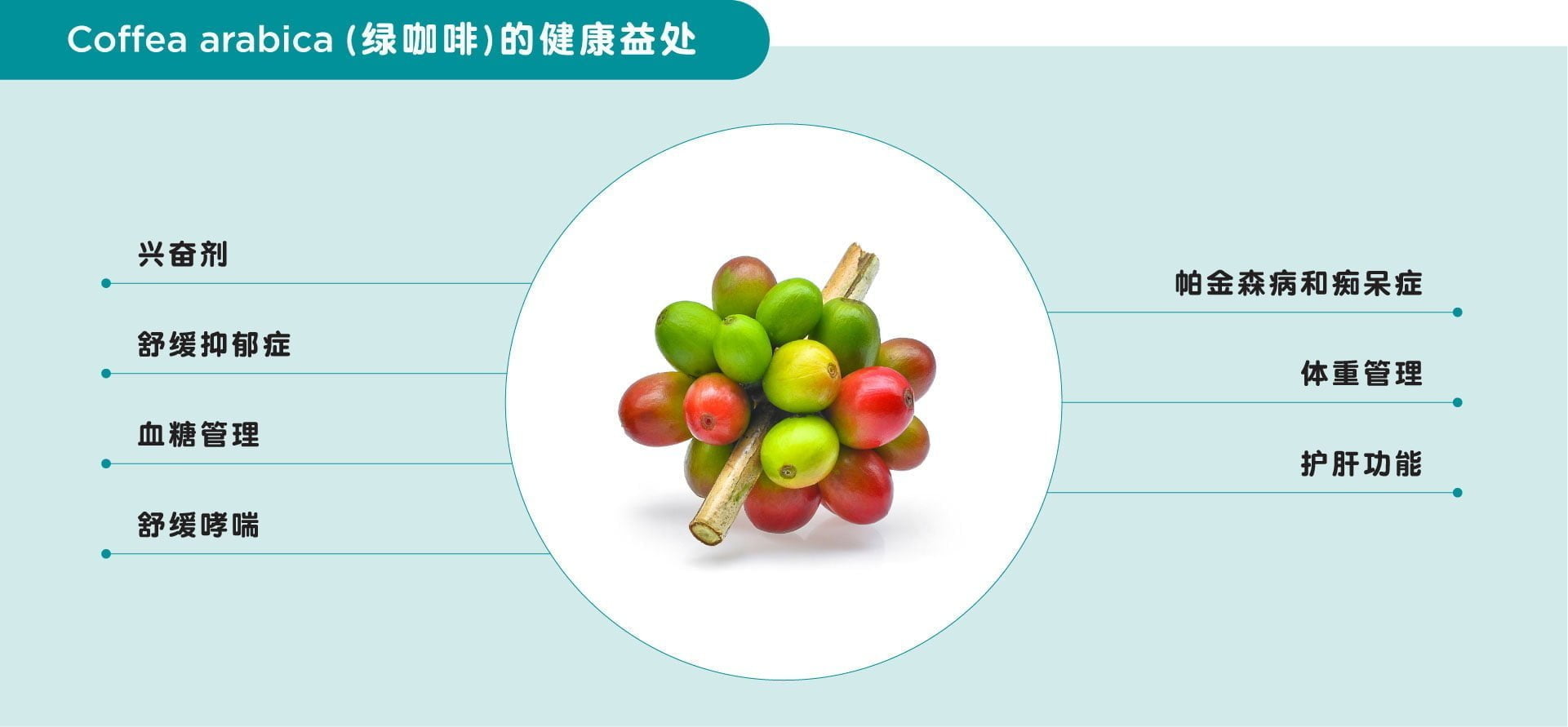阿拉比卡咖啡(绿咖啡)

Coffee Arabica (绿咖啡)
绿咖啡是指已经去皮,并且没有经过烘焙的咖啡 1。咖啡的名字源于植物阿拉比卡咖啡,它是一种来自茜草科的中等大小树木 1。咖啡是除了水以外,最受欢迎的饮料,全世界每天平均消费的数量大约16亿杯。第一世纪被种植在阿拉伯国家,而至今它的主要生产国是在巴西和哥伦比亚 1。咖啡植物的各个部位传统用于治疗流感、贫血、水肿、气喘、肝炎及其他肝脏问题,也作为嗜睡的兴奋剂,以及强心剂。它还可以帮助止咳,调理神经,治疗哮喘等 1。
营养价值
咖啡含有大量的天然抗氧化剂,如多酚类化合物。这些多酚包括咖啡因、绿原酸、二萜和胡卢巴碱 1。咖啡还含有必要的营养素,包括维生素B2、维生素B5、锰、钾、镁和烟酸 1。
健康益处
1. 兴奋剂
适量的咖啡因可有效的刺激大脑功能。它可以减少大脑中的腺苷传输。腺苷是一种神经调节剂,拥有促进睡眠和抑制唤醒的作用 2,3。因此,咖啡因可通过降低这些腺苷的活动来提高认知能力,也让人保持清醒。
2. 舒缓抑郁症
咖啡中的酸含量,包括绿原酸、阿魏酸和咖啡酸,可以帮助减少抑郁症患者大脑中神经细胞的炎症;而咖啡因可以提升能量,让幸福感倍增 4,5。研究发现,每天喝 4 杯咖啡可助减少抑郁症的风险 5。
3. 帕金森病和痴呆症
荟萃分析显示,喝咖啡的人患帕金森病的风险比不喝咖啡的人低 30% 6。咖啡因通过保护大脑中的多任务小胶质细胞发挥其神经保护作用,有助于防止认知能力下降和降低痴呆症的风险 7,8。
4. 体重管理
咖啡因的摄入可降低体重、体重指数(BMI)和身体的脂肪 9。它通过刺激肾上腺素的释放来提高新陈代谢率,还有助于分解脂肪。此外,咖啡因具有温和的利尿作用,有助于减少体内的水分重量,且不引起服用后脱水的情况 10。
5. 血糖管理
研究表明,服用 3 至 4 杯以上含咖啡因和无咖啡因的咖啡都能降低患二型糖尿病的风险 11。然而,针对咖啡如何调节血糖来预防糖尿病,此作用乃未确定 11。
6. 护肝功能
研究发现,喝咖啡的人患肝硬化的风险较低,而肝硬化是由几种肝病引起的 12,13。咖啡通过降低肝脏损坏的标志物,如天门冬氨酸氨基转移酶(AST)、丙氨酸氨基转移酶(ALT)、γ-谷氨酰转移酶(GGT)和碱性磷酸酶(ALP)来发挥其护肝作用,还有助于维护肝脏功能 14。
7. 舒缓哮喘
咖啡因拥有类似支气管扩张药物茶碱的作用。它可帮助扩张气道,舒缓哮喘症状,如喘息、呼吸困难和咳嗽。研究发现,摄入咖啡因可适度改善哮喘患者的气道功能,并持续达 4 小时 15。因经常服用而对咖啡因扩张支气管的作用产生的耐受性仍不清楚 15。
参考
1. Bisht, Shradha; Sisodia, SS (2010). Coffea arabica: A wonder gift to medical science. Journal of Natural Pharmaceuticals, 1(1), 58–65. doi:10.4103/2229-5119.73595
2. Cappelletti, S., Piacentino, D., Sani, G., & Aromatario, M. (2015). Caffeine: cognitive and physical performance enhancer or psychoactive drug?. Current neuropharmacology, 13(1), 71–88. https://doi.org/10.2174/1570159X13666141210215655
3. Nikić, Petar M.; Andrić, Branislav R.; Stojimirović, Biljana B.; Trbojevic-Stanković, Jasna; Bukumirić, Zoran (2014). Habitual coffee consumption enhances attention and vigilance in hemodialysis patients. BioMed Research International, 2014, 1–7. doi:10.1155/2014/707460
4. Pham, N. M., Nanri, A., Kurotani, K., Kuwahara, K., Kume, A., Sato, M., Hayabuchi, H., & Mizoue, T. (2014). Green tea and coffee consumption is inversely associated with depressive symptoms in a Japanese working population. Public health nutrition, 17(3), 625–633. https://doi.org/10.1017/S1368980013000360
5. Lucas, M., Mirzaei, F., Pan, A., Okereke, O. I., Willett, W. C., O’Reilly, É. J., Koenen, K., & Ascherio, A. (2011). Coffee, caffeine, and risk of depression among women. Archives of internal medicine, 171(17), 1571–1578. https://doi.org/10.1001/archinternmed.2011.393
6. Hernán, M. A., Takkouche, B., Caamaño-Isorna, F., Gestal-Otero, J. J. (2002). A meta-analysis of coffee drinking, cigarette smoking, and the risk of Parkinson’s disease. Annals of Neurology, 52(3), 276–284. doi:10.1002/ana.10277
7. Santos, C., Costa, J., Santos, J., Vaz-Carneiro, A., & Lunet, N. (2010). Caffeine intake and dementia: systematic review and meta-analysis. Journal of Alzheimer’s disease : JAD, 20 Suppl 1, S187–S204. https://doi.org/10.3233/JAD-2010-091387
8. Madeira, M. H., Boia, R., Ambrósio, A. F., & Santiago, A. R. (2017). Having a Coffee Break: The Impact of Caffeine Consumption on Microglia-Mediated Inflammation in Neurodegenerative Diseases. Mediators of inflammation, 2017, 4761081. https://doi.org/10.1155/2017/4761081
9. Tabrizi, R., Saneei, P., Lankarani, K. B., Akbari, M., Kolahdooz, F., Esmaillzadeh, A., et al. (2018). The effects of caffeine intake on weight loss: a systematic review and dose-response meta-analysis of randomized controlled trials. Critical Reviews in Food Science and Nutrition, 1–9. doi:10.1080/10408398.2018.1507996
10. R. J. Maughan; J. Griffin (2003). Caffeine ingestion and fluid balance: a review. , 16(6), 411–420. doi:10.1046/j.1365-277x.2003.00477.x
11. Huxley, R., Lee, C. M., Barzi, F., Timmermeister, L., Czernichow, S., Perkovic, V., Grobbee, D. E., Batty, D., & Woodward, M. (2009). Coffee, decaffeinated coffee, and tea consumption in relation to incident type 2 diabetes mellitus: a systematic review with meta-analysis. Archives of internal medicine, 169(22), 2053–2063. https://doi.org/10.1001/archinternmed.2009.439
12. Klatsky, Arthur L.; Morton, Cynthia; Udaltsova, Natalia; Friedman, Gary D. (2006). Coffee, Cirrhosis, and Transaminase Enzymes. Archives of Internal Medicine, 166(11), 1190–1195. doi:10.1001/archinte.166.11.1190
13. Kennedy, O.J., Fallowfield, J.A., Poole, R. et al. All coffee types decrease the risk of adverse clinical outcomes in chronic liver disease: a UK Biobank study. BMC Public Health 21, 970 (2021). https://doi.org/10.1186/s12889-021-10991-7
14. Heath, R. D., Brahmbhatt, M., Tahan, A. C., Ibdah, J. A., & Tahan, V. (2017). Coffee: The magical bean for liver diseases. World journal of hepatology, 9(15), 689–696. https://doi.org/10.4254/wjh.v9.i15.689
15. Welsh, E. J., Bara, A., Barley, E., & Cates, C. J. (2010). Caffeine for asthma. The Cochrane database of systematic reviews, 2010(1), CD001112. https://doi.org/10.1002/14651858.CD001112.pub2

